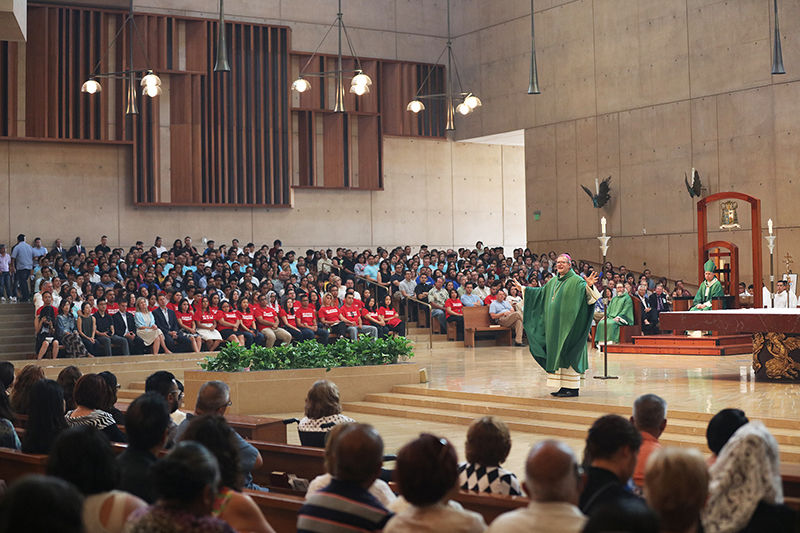Remember who you are: Although that may seem like a simple statement on the surface, it really is an unending exploration into self-understanding.
At the Rite of Calling at the Cathedral of Our Lady of the Angels this past May, Auxiliary Bishop David G. O’Connell used the phrase in his homily, indicating that his mother would remind them always when he and his brothers and sisters were young and leaving the house for school: “Remember who you are. You’re an O’Connell.” With his words, the bishop called us to remember who we are as Church.
If we use this statement as relates to the Church, it can bring up all sorts of images, different for every person. When we explore this thought as it relates to the liturgy of the Church, we need to recognize that our sense of “remembering” is far bigger than our own experience. We are caretakers or stewards of a sacred memory and that memory is much more than our own experience and understanding.
Remember who you are: The Church is a communion of saints; saints who have gone before us, saints, including all the baptized, who are living today and saints who will come after us. When we feel the need or urgency to ask that our parish prayer be what we know, want or believe to be right, we need to remember the bigger picture. We need to remember and stay informed about the prayer of the early Church, the middle ages, the Church of the Renaissance and all the way through to the 21st century. We need to remember that the Church takes many forms in many cultures around the world. The Church does not exist just for us, in this time and place. It exists, throughout time and in all ages, on behalf of all the world.
Remember who you are: Our participation at the liturgy is our surrender into the one sacrifice of Christ, kept alive in and through us at this time in the history of salvation, on behalf of the world, past, present and future. The concrete way we identify ourselves as Catholic is through our participation in the Mass. Sometimes we get that mixed up and think that we identify as Catholic by participation in the personal devotions that are private individual choices of prayer practices, such as eucharistic adoration, the rosary, Divine Mercy chaplet, etc. We need to remember that all of these forms of Catholic prayer are personal choices and not required by virtue of our baptism. What is required, by virtue of our baptism, is our participation in the Sunday Liturgy or Mass.
Remember who you are: Each time we gather for Mass, we give ourselves over to become one with that sacrifice that Jesus is for the all of humanity, throughout all time. That sacrifice of God to enter our humanity, to be in-carnate with us, shows us that even through all of our beautiful, struggling, painful, frustrating and breathtaking carnality, we can find truth by being one with that same selfless sacrifice of Jesus Christ. Meister Eckhart, the 13th century mystic encouraged that “we are all meant to be mothers of God and give birth to Jesus every day.” We become one with God and one another on behalf of the Word of God and the Mission of Jesus Christ, so that the world will not forget, so that our country will not forget. In communion with God and with one another, we become something bigger than the sum of all our individual parts. We become the mystery that is the everlasting presence of God. The Word of God and the mission of Jesus Christ need to be seen and heard now, and always. We, too often, forget who we are. So, as we approach the end of this liturgical year, let us rise up and prepare for a new beginning, remembering and proclaiming the Word of God so that we can never forget who we are and the hope to which we are called.
Joan Potano Vos is the associate director for formation in the Office for Worship of the Archdiocese of Los Angeles.

